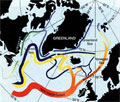
The Atlantic Conveyor, a life-giving ocean current that keeps northern Europe warm, is slowing down, scientists said on yesterday.
If the 30 percent slowdown seen over the past 12 years is not just a blip, temperatures in northern Europe could drop significantly, despite global warming, they added.
Scientists have long forecast that the Atlantic Conveyor that carries warm surface water north and cold deep water back to the equator could break down because of global warming.
According to the theory, rising air temperatures cause ice caps to melt, making the water less salty and therefore less dense so it can’t sink and flow back south.
The scientists on Wednesday said this was the first time that observations had put flesh on the bones of the theory.
“This is the first time we have observed a change in the current on a human timescale,” oceanographer Harry Bryden said, noting that it had completely shut down during the ice ages.
But he said the latest figures were far from proving a trend and that constant and long-term monitoring was needed.
“It is like a radiator heating the atmosphere and is too important to leave to periodic observations,” Bryden told a news conference to flesh out a paper he co-authored in Nature science journal.
From Morocco to Miami
The Hadley Centre for Climate Prediction and Research has calculated that if the current stopped, temperatures in northern Europe could drop by up to six degrees centigrade in 20 years.
The latest figures, collated last year, are from a string of monitoring devices at various depths in the Atlantic from Morocco to Miami.
It was the fifth snapshot since 1957 taken in the same area of the temperatures and currents in shallow, mid and deep ocean.
While measurements in 1981 and 1992 had shown little change, those in 1998 and 2004 had shown a major shift, with less of the warming Gulf Stream getting up to Greenland and less of the cold, deep returning current coming back.
The so-called Atlantic Meridional Overturning Current is known as the Atlantic Conveyor, of which the Gulf Stream is the surface component.
“This is tantalising evidence that there may be a large change in ocean circulation under way that paradoxically could cause regional cooling,” said Phil Newton of Britain’s independent Natural Environment Research Council (NERC).
However, the scientists stressed that they could not be completely sure what was driving the change or how it might alter or be compensated for by winds that pick up the radiated heat and circulate it.
Source: Reuters











Social Profiles